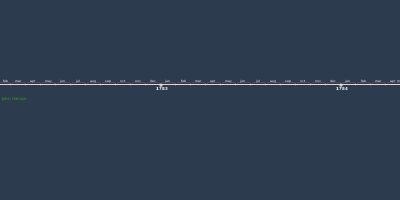3 marzo 1903 anni - Immigration Act of 1903
Descrizione:
AKA: Anarchist Exclusion ActAn Act To regulate the immigration of aliens into the United States
A law of the United States regulating immigration. It codified previous immigration law and added four inadmissible classes: anarchists, people with epilepsy, beggars, and importers of prostitutes. It had little impact and its provisions related to anarchists were expanded in the Immigration Act of 1918.
Anarchism came to public attention in the United States with the Haymarket Affair of 1886. On May 4, a policeman was killed and several others were wounded, of which six later died after a bomb exploded in Chicago's Haymarket Square. Eight members of the recently formed International Working People's Association (IWPA) were found guilty of the bombing. The IWPA's 1883 manifesto called for the "destruction of the existing class rule, by all means, i.e., by energetic, relentless, revolutionary and international action".
The idea of excluding anarchists from immigrating was first mentioned at a Congressional hearing in 1889. A bill introduced on July 20, 1894, sought to restrict the entry of anarchists by requiring potential immigrants to visit a U. S. consulate for a political review before immigrating. A substitute bill proposed a system within the United States to detect, question, and deport immigrants accused of anarchism. Both died in committee.
On September 6, 1901, Leon F. Czolgosz, an American-born son of Polish immigrants and a self-proclaimed anarchist assassinated President William McKinley. The police responded by arresting a number of anarchists, including Emma Goldman and a group of Chicago anarchists that published Free Society, the leading English-language Communist-anarchist periodical in the U.S. at the time. They were all later released because no evidence of conspiracy could be found. And there were some viewpoints in the anarchist opinion which strongly denounced Czolgosz, some calling him a "dangerous crank", despite what was to come next.
Theodore Roosevelt urged the exclusion and deportation of anarchist immigrants in his first address to Congress on December 3, 1901.
The impact of the law was slight. The Commissioner-General of Immigration reported that from the time the law took effect in 1903 until June 30, 1914, a total of 15 anarchists were denied entry to the U.S. He reported that four anarchists were expelled in 1913 and three in 1914.
The Act was re-enacted on June 29, 1906.
Advocates for using the immigration laws to combat radicalism campaigned to expand the law's definitions of those who could be excluded or deported. Immigration officials complained about the law's limitation on deportation to the first three years of an immigrant's residency:
The anarchist of foreign birth ... remains very quiet, as a rule, until the time limit protects him from deportation and then he is loud and boisterous and begins his maniac cry against all forms of organized government. ... There should be no time limit to the deportation of these criminals ... and should one remain in hiding sufficiently long to become naturalized he should, at the first symptoms, be shorn of his cloak and forthwith deported.
Aggiunto al nastro di tempo:
Data:
3 marzo 1903 anni
Adesso
~ 122 years ago
